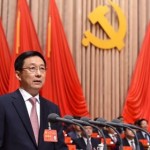We now know who will run China for the next five years. The Communist Party of China (CPC) declared the country’s new leadership at the recent 19th Party Congress. Within this group is Han Zheng, recently promoted to the top leadership and thought to be the man most likely to run China’s economy.
Some background here may be useful. China’s peak body is the CPC’s Central Committee. Consisting of a little over 200 people, it meets only once a year or so, delegating almost all powers to a 25-member Politburo, which, in turn, devolves many of its powers to the seven-member Politburo Standing Committee (PBSC). The Party Congress determines who will sit on each of these committees.
The PBSC is the centre of most attention during the congress as its seven members are the heads of all the most relevant bodies within the Chinese system. So China’s ruler, Xi Jinping, is the head of the Party, the ex officio head of the PBSC, and also in charge of China’s military and foreign policy.
There are two government positions on the PBSC. The first is China’s head of government, the equivalent to a prime minister. The second is for the head of China’s economy. In China, the economy is under the control of the government, which is itself controlled by the Party: the heads of the government are Party members, and therefore, subject to Party rules before other laws.
So the second most powerful government official in China is one of the top Party leaders and he—it is always a ‘he’—is traditionally in charge of China’s economy.
The apparatchik who qualifies best is Han Zheng, currently ranked seventh in the Party hierarchy. The final portfolios of PBSC members will become public only in March when the government appoints its leaders, but there are strong reasons that recommend Han for the job. Han has spent almost his entire working life based in his native Shanghai, China’s second city which is traditionally regarded a cradle of leaders. It is the wheel of the China deal, a major hub of China’s trade, the world’s busiest container port and a traditional entrepot for the many businesses seeking to enter the Chinese market.
Shanghai leaders almost always get a seat at the PBSC. Han’s promotion from running Shanghai to Beijing and being drafted into the Standing Committee is thus a logical progression. He was a young mayor of Shanghai who remained loyal to many powerful patrons in the city all of whom went on to become China’s top leaders when they left for Beijing. So now Han too will get his reward, finally.
Another part of the Han accession is even simpler to explain: he is thought to be close to current ruler Xi Jinping. Han served as Xi’s deputy in Shanghai in 2007, before Xi moved to Beijing to be groomed for his ascension to the head of China’s government. In recent months Xi has moved a number of his other former employees into the top economic advisory roles.
So now that we know where he sits, and can guess how he got there, what can we expect from Han in his new role? Those desiring more freedom for the market in China will welcome his appointment as he was behind many reforms designed to promote it. While he was head of the city, Shanghai ran pilots in financial liberalisation, free-trade zones and reduced property tax. As financial and property market reform remain the two largest economic and fiscal issues China faces, these pilot programmes are likely to be of invaluable experience to him in his present capacity.
Han has also proved to be an efficient administrator. He rose to prominence when called in to defuse the crisis that resulted in 2006 when Shanghai’s then leader, Chen Xitong, was arrested and convicted for corruption (and insubordination). Han also oversaw Shanghai’s hosting of Expo 2010 and its becoming the world’s busiest container port in terms of cargo throughput. Finally, Shanghai’s local economic growth last year exceeded the national average for the first time in eight years. He also managed to secure both a Formula One race and a Disneyland for Shanghai, pleasing mouse enthusiasts and motorists alike.
What will be on Han’s plate? He will have to chair many committees to help oversee the economy and financial system, and also possibly, the new super regulator, the Financial Stability Development Commission. The new body, unveiled by Xi in July, is designed to coordinate the responses of the central bank and the securities, banking and insurance watchdogs. He will need to ensure progress in poverty alleviation and environmental protection goals, Xi Jinping’s current policy areas of focus.
Han remains Xi Jinping’s man. Should they not see eye to eye on matters, market-based reform and efficient governance will take second place to following the leader.
Dr Ryan Manuel is an AsiaGlobal Fellow at the University of Hong Kong. He is currently completing a manuscript on the rules of the Chinese political system.
This article was exclusively written for Gateway House: Indian Council on Global Relations. You can read more exclusive content here.
For interview requests with the author, or for permission to republish, please contact outreach@gatewayhouse.in.
© Copyright 2018 Gateway House: Indian Council on Global Relations. All rights reserved. Any unauthorized copying or reproduction is strictly prohibited


